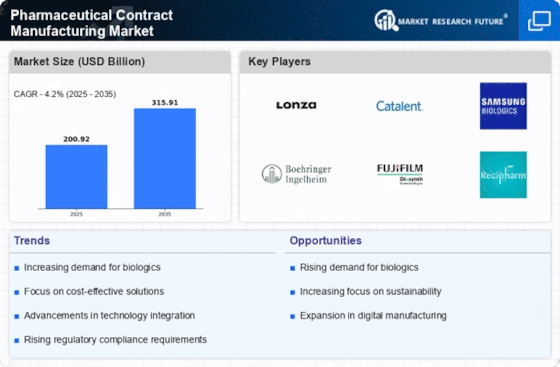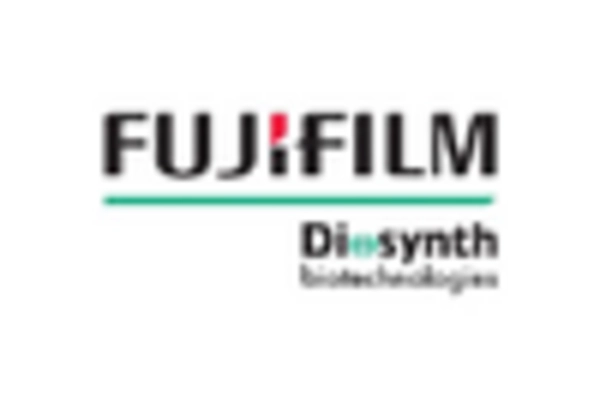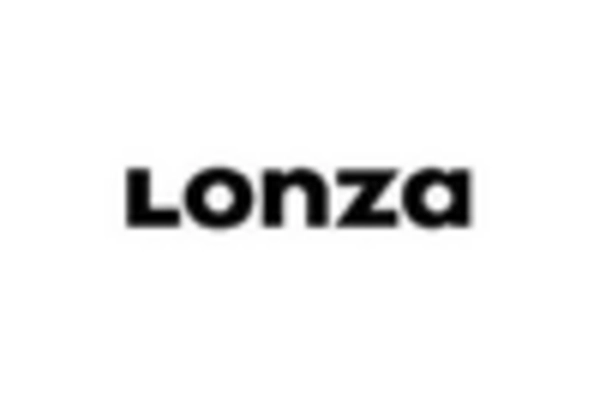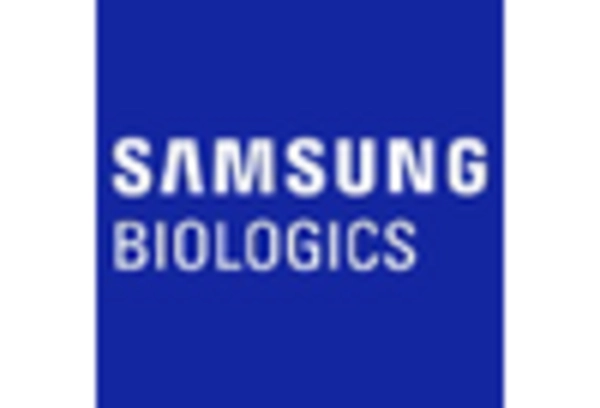Active Pharmaceutical Ingredients
Formulated Products
Packaging Services
Contract Manufacturing
Contract Research
Product Development
Oncology
Cardiology
Neurology
Infectious Diseases
Pharmaceutical Companies
Biotechnology Companies
Generic Drug Manufacturers
North America
Europe
South America
Asia Pacific
Middle East and Africa
North America Outlook (USD Billion, 2019-2035)
Pharmaceutical Contract Manufacturing Market by Manufacturing Type
Active Pharmaceutical Ingredients
Formulated Products
Packaging Services
Pharmaceutical Contract Manufacturing Market by Service Type
Contract Manufacturing
Contract Research
Product Development
Pharmaceutical Contract Manufacturing Market by Therapeutic Area Type
Oncology
Cardiology
Neurology
Infectious Diseases
Pharmaceutical Contract Manufacturing Market by End User Type
Pharmaceutical Companies
Biotechnology Companies
Generic Drug Manufacturers
Pharmaceutical Contract Manufacturing Market by Regional Type
US
Canada
US Outlook (USD Billion, 2019-2035)
Pharmaceutical Contract Manufacturing Market by Manufacturing Type
Active Pharmaceutical Ingredients
Formulated Products
Packaging Services
Pharmaceutical Contract Manufacturing Market by Service Type
Contract Manufacturing
Contract Research
Product Development
Pharmaceutical Contract Manufacturing Market by Therapeutic Area Type
Oncology
Cardiology
Neurology
Infectious Diseases
Pharmaceutical Contract Manufacturing Market by End User Type
Pharmaceutical Companies
Biotechnology Companies
Generic Drug Manufacturers
CANADA Outlook (USD Billion, 2019-2035)
Pharmaceutical Contract Manufacturing Market by Manufacturing Type
Active Pharmaceutical Ingredients
Formulated Products
Packaging Services
Pharmaceutical Contract Manufacturing Market by Service Type
Contract Manufacturing
Contract Research
Product Development
Pharmaceutical Contract Manufacturing Market by Therapeutic Area Type
Oncology
Cardiology
Neurology
Infectious Diseases
Pharmaceutical Contract Manufacturing Market by End User Type
Pharmaceutical Companies
Biotechnology Companies
Generic Drug Manufacturers
Europe Outlook (USD Billion, 2019-2035)
Pharmaceutical Contract Manufacturing Market by Manufacturing Type
Active Pharmaceutical Ingredients
Formulated Products
Packaging Services
Pharmaceutical Contract Manufacturing Market by Service Type
Contract Manufacturing
Contract Research
Product Development
Pharmaceutical Contract Manufacturing Market by Therapeutic Area Type
Oncology
Cardiology
Neurology
Infectious Diseases
Pharmaceutical Contract Manufacturing Market by End User Type
Pharmaceutical Companies
Biotechnology Companies
Generic Drug Manufacturers
Pharmaceutical Contract Manufacturing Market by Regional Type
Germany
UK
France
Russia
Italy
Spain
Rest of Europe
GERMANY Outlook (USD Billion, 2019-2035)
Pharmaceutical Contract Manufacturing Market by Manufacturing Type
Active Pharmaceutical Ingredients
Formulated Products
Packaging Services
Pharmaceutical Contract Manufacturing Market by Service Type
Contract Manufacturing
Contract Research
Product Development
Pharmaceutical Contract Manufacturing Market by Therapeutic Area Type
Oncology
Cardiology
Neurology
Infectious Diseases
Pharmaceutical Contract Manufacturing Market by End User Type
Pharmaceutical Companies
Biotechnology Companies
Generic Drug Manufacturers
UK Outlook (USD Billion, 2019-2035)
Pharmaceutical Contract Manufacturing Market by Manufacturing Type
Active Pharmaceutical Ingredients
Formulated Products
Packaging Services
Pharmaceutical Contract Manufacturing Market by Service Type
Contract Manufacturing
Contract Research
Product Development
Pharmaceutical Contract Manufacturing Market by Therapeutic Area Type
Oncology
Cardiology
Neurology
Infectious Diseases
Pharmaceutical Contract Manufacturing Market by End User Type
Pharmaceutical Companies
Biotechnology Companies
Generic Drug Manufacturers
FRANCE Outlook (USD Billion, 2019-2035)
Pharmaceutical Contract Manufacturing Market by Manufacturing Type
Active Pharmaceutical Ingredients
Formulated Products
Packaging Services
Pharmaceutical Contract Manufacturing Market by Service Type
Contract Manufacturing
Contract Research
Product Development
Pharmaceutical Contract Manufacturing Market by Therapeutic Area Type
Oncology
Cardiology
Neurology
Infectious Diseases
Pharmaceutical Contract Manufacturing Market by End User Type
Pharmaceutical Companies
Biotechnology Companies
Generic Drug Manufacturers
RUSSIA Outlook (USD Billion, 2019-2035)
Pharmaceutical Contract Manufacturing Market by Manufacturing Type
Active Pharmaceutical Ingredients
Formulated Products
Packaging Services
Pharmaceutical Contract Manufacturing Market by Service Type
Contract Manufacturing
Contract Research
Product Development
Pharmaceutical Contract Manufacturing Market by Therapeutic Area Type
Oncology
Cardiology
Neurology
Infectious Diseases
Pharmaceutical Contract Manufacturing Market by End User Type
Pharmaceutical Companies
Biotechnology Companies
Generic Drug Manufacturers
ITALY Outlook (USD Billion, 2019-2035)
Pharmaceutical Contract Manufacturing Market by Manufacturing Type
Active Pharmaceutical Ingredients
Formulated Products
Packaging Services
Pharmaceutical Contract Manufacturing Market by Service Type
Contract Manufacturing
Contract Research
Product Development
Pharmaceutical Contract Manufacturing Market by Therapeutic Area Type
Oncology
Cardiology
Neurology
Infectious Diseases
Pharmaceutical Contract Manufacturing Market by End User Type
Pharmaceutical Companies
Biotechnology Companies
Generic Drug Manufacturers
SPAIN Outlook (USD Billion, 2019-2035)
Pharmaceutical Contract Manufacturing Market by Manufacturing Type
Active Pharmaceutical Ingredients
Formulated Products
Packaging Services
Pharmaceutical Contract Manufacturing Market by Service Type
Contract Manufacturing
Contract Research
Product Development
Pharmaceutical Contract Manufacturing Market by Therapeutic Area Type
Oncology
Cardiology
Neurology
Infectious Diseases
Pharmaceutical Contract Manufacturing Market by End User Type
Pharmaceutical Companies
Biotechnology Companies
Generic Drug Manufacturers
REST OF EUROPE Outlook (USD Billion, 2019-2035)
Pharmaceutical Contract Manufacturing Market by Manufacturing Type
Active Pharmaceutical Ingredients
Formulated Products
Packaging Services
Pharmaceutical Contract Manufacturing Market by Service Type
Contract Manufacturing
Contract Research
Product Development
Pharmaceutical Contract Manufacturing Market by Therapeutic Area Type
Oncology
Cardiology
Neurology
Infectious Diseases
Pharmaceutical Contract Manufacturing Market by End User Type
Pharmaceutical Companies
Biotechnology Companies
Generic Drug Manufacturers
APAC Outlook (USD Billion, 2019-2035)
Pharmaceutical Contract Manufacturing Market by Manufacturing Type
Active Pharmaceutical Ingredients
Formulated Products
Packaging Services
Pharmaceutical Contract Manufacturing Market by Service Type
Contract Manufacturing
Contract Research
Product Development
Pharmaceutical Contract Manufacturing Market by Therapeutic Area Type
Oncology
Cardiology
Neurology
Infectious Diseases
Pharmaceutical Contract Manufacturing Market by End User Type
Pharmaceutical Companies
Biotechnology Companies
Generic Drug Manufacturers
Pharmaceutical Contract Manufacturing Market by Regional Type
China
India
Japan
South Korea
Malaysia
Thailand
Indonesia
Rest of APAC
CHINA Outlook (USD Billion, 2019-2035)
Pharmaceutical Contract Manufacturing Market by Manufacturing Type
Active Pharmaceutical Ingredients
Formulated Products
Packaging Services
Pharmaceutical Contract Manufacturing Market by Service Type
Contract Manufacturing
Contract Research
Product Development
Pharmaceutical Contract Manufacturing Market by Therapeutic Area Type
Oncology
Cardiology
Neurology
Infectious Diseases
Pharmaceutical Contract Manufacturing Market by End User Type
Pharmaceutical Companies
Biotechnology Companies
Generic Drug Manufacturers
INDIA Outlook (USD Billion, 2019-2035)
Pharmaceutical Contract Manufacturing Market by Manufacturing Type
Active Pharmaceutical Ingredients
Formulated Products
Packaging Services
Pharmaceutical Contract Manufacturing Market by Service Type
Contract Manufacturing
Contract Research
Product Development
Pharmaceutical Contract Manufacturing Market by Therapeutic Area Type
Oncology
Cardiology
Neurology
Infectious Diseases
Pharmaceutical Contract Manufacturing Market by End User Type
Pharmaceutical Companies
Biotechnology Companies
Generic Drug Manufacturers
JAPAN Outlook (USD Billion, 2019-2035)
Pharmaceutical Contract Manufacturing Market by Manufacturing Type
Active Pharmaceutical Ingredients
Formulated Products
Packaging Services
Pharmaceutical Contract Manufacturing Market by Service Type
Contract Manufacturing
Contract Research
Product Development
Pharmaceutical Contract Manufacturing Market by Therapeutic Area Type
Oncology
Cardiology
Neurology
Infectious Diseases
Pharmaceutical Contract Manufacturing Market by End User Type
Pharmaceutical Companies
Biotechnology Companies
Generic Drug Manufacturers
SOUTH KOREA Outlook (USD Billion, 2019-2035)
Pharmaceutical Contract Manufacturing Market by Manufacturing Type
Active Pharmaceutical Ingredients
Formulated Products
Packaging Services
Pharmaceutical Contract Manufacturing Market by Service Type
Contract Manufacturing
Contract Research
Product Development
Pharmaceutical Contract Manufacturing Market by Therapeutic Area Type
Oncology
Cardiology
Neurology
Infectious Diseases
Pharmaceutical Contract Manufacturing Market by End User Type
Pharmaceutical Companies
Biotechnology Companies
Generic Drug Manufacturers
MALAYSIA Outlook (USD Billion, 2019-2035)
Pharmaceutical Contract Manufacturing Market by Manufacturing Type
Active Pharmaceutical Ingredients
Formulated Products
Packaging Services
Pharmaceutical Contract Manufacturing Market by Service Type
Contract Manufacturing
Contract Research
Product Development
Pharmaceutical Contract Manufacturing Market by Therapeutic Area Type
Oncology
Cardiology
Neurology
Infectious Diseases
Pharmaceutical Contract Manufacturing Market by End User Type
Pharmaceutical Companies
Biotechnology Companies
Generic Drug Manufacturers
THAILAND Outlook (USD Billion, 2019-2035)
Pharmaceutical Contract Manufacturing Market by Manufacturing Type
Active Pharmaceutical Ingredients
Formulated Products
Packaging Services
Pharmaceutical Contract Manufacturing Market by Service Type
Contract Manufacturing
Contract Research
Product Development
Pharmaceutical Contract Manufacturing Market by Therapeutic Area Type
Oncology
Cardiology
Neurology
Infectious Diseases
Pharmaceutical Contract Manufacturing Market by End User Type
Pharmaceutical Companies
Biotechnology Companies
Generic Drug Manufacturers
INDONESIA Outlook (USD Billion, 2019-2035)
Pharmaceutical Contract Manufacturing Market by Manufacturing Type
Active Pharmaceutical Ingredients
Formulated Products
Packaging Services
Pharmaceutical Contract Manufacturing Market by Service Type
Contract Manufacturing
Contract Research
Product Development
Pharmaceutical Contract Manufacturing Market by Therapeutic Area Type
Oncology
Cardiology
Neurology
Infectious Diseases
Pharmaceutical Contract Manufacturing Market by End User Type
Pharmaceutical Companies
Biotechnology Companies
Generic Drug Manufacturers
REST OF APAC Outlook (USD Billion, 2019-2035)
Pharmaceutical Contract Manufacturing Market by Manufacturing Type
Active Pharmaceutical Ingredients
Formulated Products
Packaging Services
Pharmaceutical Contract Manufacturing Market by Service Type
Contract Manufacturing
Contract Research
Product Development
Pharmaceutical Contract Manufacturing Market by Therapeutic Area Type
Oncology
Cardiology
Neurology
Infectious Diseases
Pharmaceutical Contract Manufacturing Market by End User Type
Pharmaceutical Companies
Biotechnology Companies
Generic Drug Manufacturers
South America Outlook (USD Billion, 2019-2035)
Pharmaceutical Contract Manufacturing Market by Manufacturing Type
Active Pharmaceutical Ingredients
Formulated Products
Packaging Services
Pharmaceutical Contract Manufacturing Market by Service Type
Contract Manufacturing
Contract Research
Product Development
Pharmaceutical Contract Manufacturing Market by Therapeutic Area Type
Oncology
Cardiology
Neurology
Infectious Diseases
Pharmaceutical Contract Manufacturing Market by End User Type
Pharmaceutical Companies
Biotechnology Companies
Generic Drug Manufacturers
Pharmaceutical Contract Manufacturing Market by Regional Type
Brazil
Mexico
Argentina
Rest of South America
BRAZIL Outlook (USD Billion, 2019-2035)
Pharmaceutical Contract Manufacturing Market by Manufacturing Type
Active Pharmaceutical Ingredients
Formulated Products
Packaging Services
Pharmaceutical Contract Manufacturing Market by Service Type
Contract Manufacturing
Contract Research
Product Development
Pharmaceutical Contract Manufacturing Market by Therapeutic Area Type
Oncology
Cardiology
Neurology
Infectious Diseases
Pharmaceutical Contract Manufacturing Market by End User Type
Pharmaceutical Companies
Biotechnology Companies
Generic Drug Manufacturers
MEXICO Outlook (USD Billion, 2019-2035)
Pharmaceutical Contract Manufacturing Market by Manufacturing Type
Active Pharmaceutical Ingredients
Formulated Products
Packaging Services
Pharmaceutical Contract Manufacturing Market by Service Type
Contract Manufacturing
Contract Research
Product Development
Pharmaceutical Contract Manufacturing Market by Therapeutic Area Type
Oncology
Cardiology
Neurology
Infectious Diseases
Pharmaceutical Contract Manufacturing Market by End User Type
Pharmaceutical Companies
Biotechnology Companies
Generic Drug Manufacturers
ARGENTINA Outlook (USD Billion, 2019-2035)
Pharmaceutical Contract Manufacturing Market by Manufacturing Type
Active Pharmaceutical Ingredients
Formulated Products
Packaging Services
Pharmaceutical Contract Manufacturing Market by Service Type
Contract Manufacturing
Contract Research
Product Development
Pharmaceutical Contract Manufacturing Market by Therapeutic Area Type
Oncology
Cardiology
Neurology
Infectious Diseases
Pharmaceutical Contract Manufacturing Market by End User Type
Pharmaceutical Companies
Biotechnology Companies
Generic Drug Manufacturers
REST OF SOUTH AMERICA Outlook (USD Billion, 2019-2035)
Pharmaceutical Contract Manufacturing Market by Manufacturing Type
Active Pharmaceutical Ingredients
Formulated Products
Packaging Services
Pharmaceutical Contract Manufacturing Market by Service Type
Contract Manufacturing
Contract Research
Product Development
Pharmaceutical Contract Manufacturing Market by Therapeutic Area Type
Oncology
Cardiology
Neurology
Infectious Diseases
Pharmaceutical Contract Manufacturing Market by End User Type
Pharmaceutical Companies
Biotechnology Companies
Generic Drug Manufacturers
MEA Outlook (USD Billion, 2019-2035)
Pharmaceutical Contract Manufacturing Market by Manufacturing Type
Active Pharmaceutical Ingredients
Formulated Products
Packaging Services
Pharmaceutical Contract Manufacturing Market by Service Type
Contract Manufacturing
Contract Research
Product Development
Pharmaceutical Contract Manufacturing Market by Therapeutic Area Type
Oncology
Cardiology
Neurology
Infectious Diseases
Pharmaceutical Contract Manufacturing Market by End User Type
Pharmaceutical Companies
Biotechnology Companies
Generic Drug Manufacturers
Pharmaceutical Contract Manufacturing Market by Regional Type
GCC Countries
South Africa
Rest of MEA
GCC COUNTRIES Outlook (USD Billion, 2019-2035)
Pharmaceutical Contract Manufacturing Market by Manufacturing Type
Active Pharmaceutical Ingredients
Formulated Products
Packaging Services
Pharmaceutical Contract Manufacturing Market by Service Type
Contract Manufacturing
Contract Research
Product Development
Pharmaceutical Contract Manufacturing Market by Therapeutic Area Type
Oncology
Cardiology
Neurology
Infectious Diseases
Pharmaceutical Contract Manufacturing Market by End User Type
Pharmaceutical Companies
Biotechnology Companies
Generic Drug Manufacturers
SOUTH AFRICA Outlook (USD Billion, 2019-2035)
Pharmaceutical Contract Manufacturing Market by Manufacturing Type
Active Pharmaceutical Ingredients
Formulated Products
Packaging Services
Pharmaceutical Contract Manufacturing Market by Service Type
Contract Manufacturing
Contract Research
Product Development
Pharmaceutical Contract Manufacturing Market by Therapeutic Area Type
Oncology
Cardiology
Neurology
Infectious Diseases
Pharmaceutical Contract Manufacturing Market by End User Type
Pharmaceutical Companies
Biotechnology Companies
Generic Drug Manufacturers
REST OF MEA Outlook (USD Billion, 2019-2035)
Pharmaceutical Contract Manufacturing Market by Manufacturing Type
Active Pharmaceutical Ingredients
Formulated Products
Packaging Services
Pharmaceutical Contract Manufacturing Market by Service Type
Contract Manufacturing
Contract Research
Product Development
Pharmaceutical Contract Manufacturing Market by Therapeutic Area Type
Oncology
Cardiology
Neurology
Infectious Diseases
Pharmaceutical Contract Manufacturing Market by End User Type
Pharmaceutical Companies
Biotechnology Companies
Generic Drug Manufacturers



















Leave a Comment